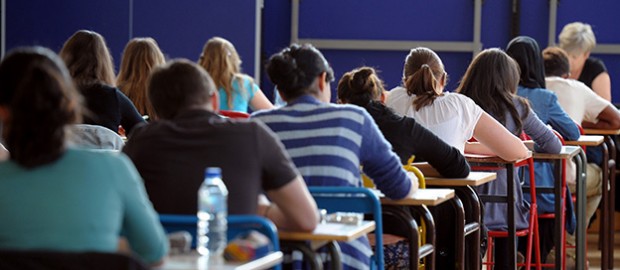What Role Should Tests Play In Judging Indiana Schools?
“Hoosiers really need to have a conversation about testing” and what role it should play in Indiana classrooms, Indy Star education reporter Scott Elliott wrote earlier this month:
Here’s the thing about standardized tests like the ISTEP and end-of-course exams given in Indiana — there’s a lot of disagreement about their value and how they are used. That is a fair debate…
A standardized test can never tell you everything about the test taker… But what standardized tests are very good at is telling a student how they compare to their peers at that moment. Even if you consider all the blind spots of the test… you can still learn something from the comparisons.
In a way, the debate Elliott called for played out on a national scale in The New York Times opinion section over the weekend.
The Times‘ “Room For Debate” feature asked whether there was a way to fairly assess a school’s performance without “provid[ing] incentives for obsessive testing and cheating,” especially as many states — including Indiana — craft their own replacements for No Child Left Behind.
ICYMI, here are some of the responses the Times collected. Julia Fox, a California high school sophomore, wrote:
No Child Left Behind was established just as I was going into kindergarten, so I’ve grown up with this law. I’ve always ended the school year with the required tests, so I’ve never known anything different.
Tests are important, but are not the only way to find out what kids can do. I know I am not the best test taker, so multiple choice tests aren’t always the best way to show my abilities. And I wouldn’t want to just learn how to score better on them.
Former Indy Star writer RiShawn Biddle says testing isn’t perfect, but writes that he’s more concerned states will throw out the good parts of NCLB along with the bad:
Some worry that using student test data to measure teacher performance will unfairly hurt teachers. But this is the wrong worry. Certainly standardized testing isn’t perfect. But… testing has proven to be the best, most-objective tool for measuring both student and teacher success…
Instead of worrying about testing, we should be concerned about rolling back our nation’s commitment to providing high-quality education to the kids who have historically been the worst-served by our traditional public schools. Our children deserve better.
And here’s Kevin Carey of the New America Foundation, a non-partisan think tank:
Objective test score information should remain part of school evaluation. Most parents wouldn’t sit lightly if their child flunked basic tests in reading and math. Society should be similarly alarmed when whole schools full of students fail tests — a tragedy that remains all too common, even after a decade of No Child Left Behind. But we now have the opportunity to broaden the scope of information used to rate schools, and rely more heavily on trained evaluators to interpret that information. When Congress writes the next version of No Child Left Behind, it should move in this direction.
Elliott called for a conversation, The New York Times is obliging on a national level. But the conversation about the effects of rating schools is much less abstract in Indiana than it is in many other states — here, state takeovers at five schools and closures of charter schools have resulted from poor test scores.
So, Hoosiers, let’s pose the Times‘ question here — add your thoughts in our comments section:
How can you measure the achievement of students, teachers and schools in a way that is fair, accurate and doesn’t provide incentives for obsessive testing, and cheating?


